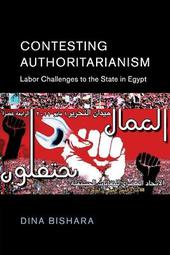
|
Contesting Authoritarianism: Labor Challenges to the State in Egypt
Paperback / softback
Main Details
| Title |
Contesting Authoritarianism: Labor Challenges to the State in Egypt
|
| Authors and Contributors |
By (author) Dina Bishara
|
| Series | Cambridge Middle East Studies |
|---|
| Physical Properties |
| Format:Paperback / softback | | Pages:204 | | Dimensions(mm): Height 228,Width 151 |
|
| ISBN/Barcode |
9781316644720
|
| Classifications | Dewey:331.880962 |
|---|
| Audience | | Tertiary Education (US: College) | | Professional & Vocational | |
|---|
| Illustrations |
Worked examples or Exercises; 1 Tables, black and white; 2 Maps; 1 Line drawings, black and white
|
|
Publishing Details |
| Publisher |
Cambridge University Press
|
| Imprint |
Cambridge University Press
|
| Publication Date |
30 August 2018 |
| Publication Country |
United Kingdom
|
Description
Successive authoritarian regimes have maintained tight control over organized labor in Egypt since the 1950s. And yet in 2009, a group of civil servants decided to exit the state-controlled Egyptian Trade Union Federation (ETUF), thereby setting a precedent for other groups and threatening the ETUF's monopoly. Dina Bishara examines this relationship between labour organizations and the state to shed light on how political change occurs within an authoritarian government, and to show how ordinary Egyptians perceive the government's rule. In particular, Bishara highlights the agency of dissident unionists in challenging the state even when trade union leaders remain loyal. She reveals that militant sectors are more vulnerable to greater scrutiny and repression and that financial benefits tied to membership in state-backed unions can provide significant disincentives against the exit option. Moving beyond conventional accounts of top-down control, this book explores when and how institutions designed for political control become contested from below.
Author Biography
Dina Bishara is Assistant Professor of Political Science at the University of Alabama. She has published in outlets such as Perspectives on Politics and Middle East Law and Governance and has received a number of fellowships, including postdoctoral fellowships from Harvard University, the University of Oxford, and the German Institute for International and Security Affairs.
|